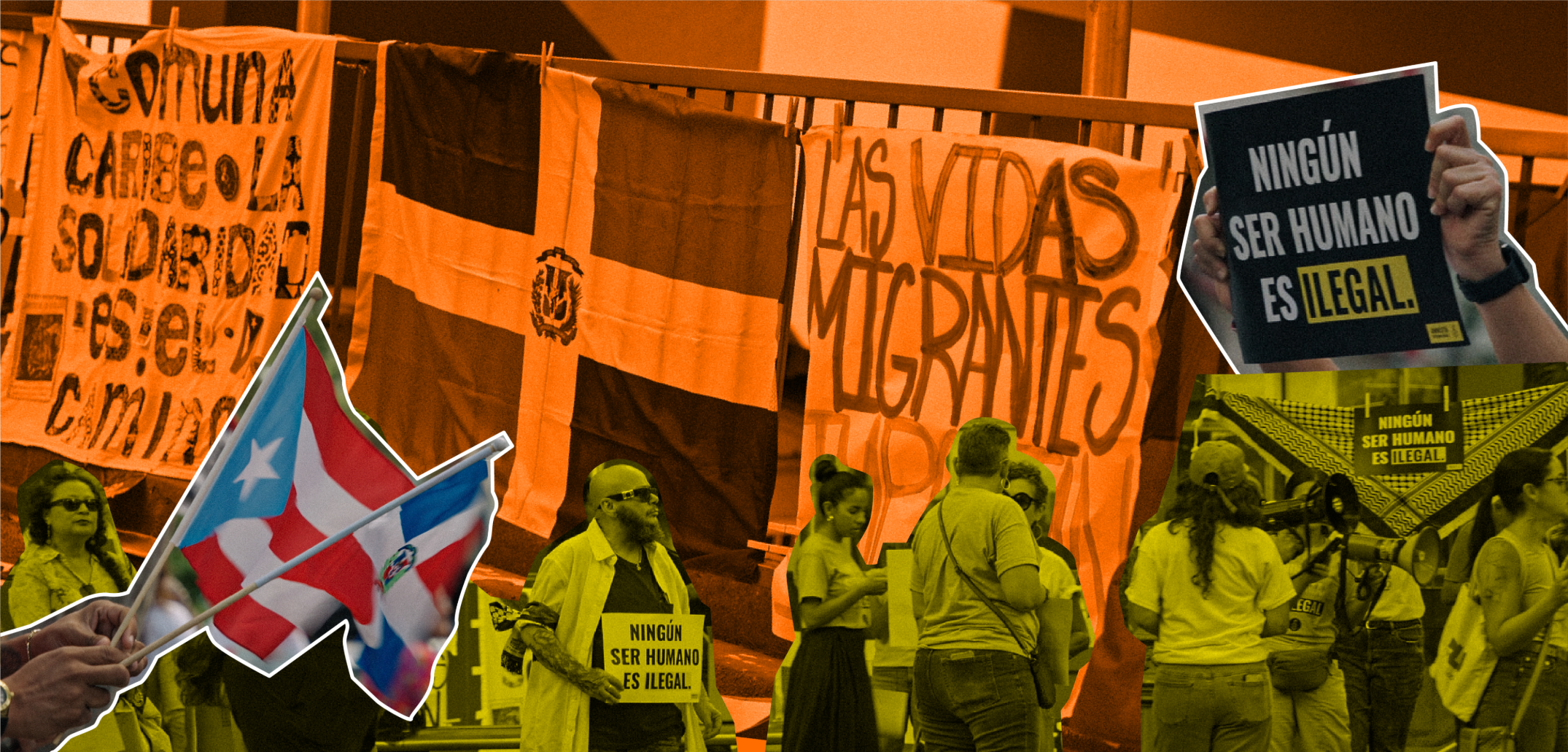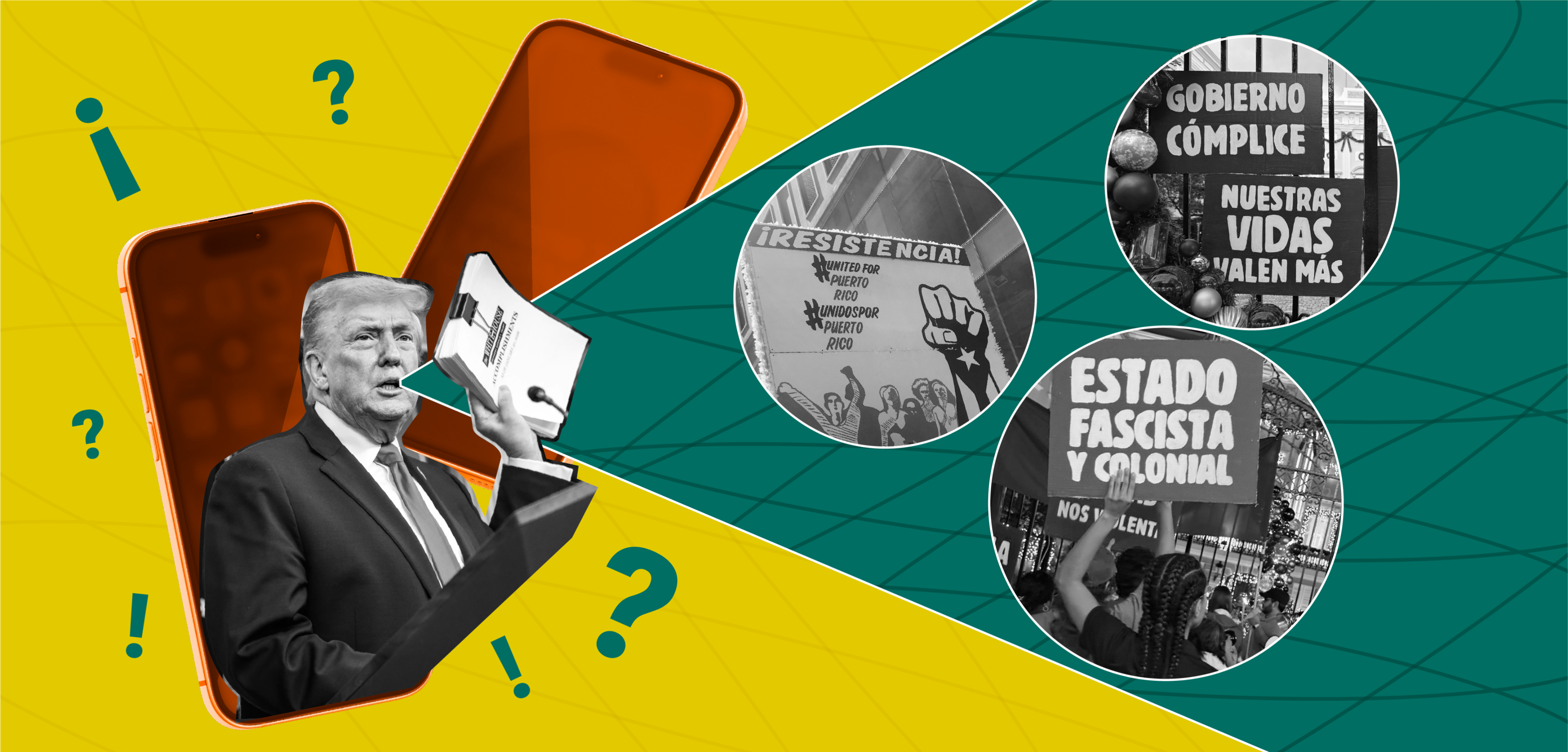.png)
Voices Beyond Votes
Citizens in Puerto Rico and other colonized U.S. territories can’t vote in federal elections, but they are still active participants in democracy
This article was originally published in Yes! Magazine.
Alicia Nebot still remembers the call she received 16 years ago that sparked a movement in Río Piedras. That day, the reverend of her church told her that the Municipality of San Juan, the capital city, was expropriating the property where they congregated. “We were shocked,” she says. Nebot could not believe the municipality was threatening to strip the church of the building it had existed in for 50 years. The church sat on Arzuaga Street, one of the main streets in Río Piedras, teeming with small, locally owned businesses.
Nebot and the reverend immediately set a meeting with CAUCE, the office that serves as a liaison between the University of Puerto Rico, the community, and the government. During that meeting, they learned that San Juan’s then-mayor, Jorge Santini, had announced a development, Río 2012, that included the demolition of more than 100 buildings in Río Piedras.
“He wanted to rebuild Río Piedras by destroying Río Piedras,” recalls José Luis González, a resident of García Ubarri, one of eight communities that surround the historic center.
That summer, 180 people gathered at the First Baptist Church of Río Piedras to form the Community Board of the Río Piedras Urban Area, with representatives from the eight communities surrounding Río Piedras. Attendees signed a community manifesto that established an alternative plan to Río 2012, one that would secure affordable housing.
.jpeg)
After five years of organizing, the Río Piedras community successfully blocked Santini’s plan from being implemented. “The community board at that time did a lot of advocacy,” says Mónica Ponce-Caballero, director of CAUCE. “With proposals and data, we paralyzed the project. That has been our most significant achievement.”
After that victory, the community succeeded in amending the Río Piedras Rehabilitation Act to include a land trust that ensures affordable housing and helps avoid gentrification. The community board’s involvement in policymaking, campaigning on social issues, organizing neighborly meetings, and debating ideas is an example of how people civically engage beyond election day. Above all, it’s an instance of a community working toward issues that matter to them in a context where there is no real democracy.
Disenchanted But Not Disempowered
“Puerto Rico is not a democracy because it is a colony, and in a colony, by definition, the people do not give themselves their own laws,” says Joel Colón-Ríos, professor of law at the University of Essex in the United Kingdom. “However, this does not mean that democratic spaces cannot exist in Puerto Rico.” A true government by the people should not only be about participating in discussions, but about “making binding decisions about the rules and policies that apply to the community,” he adds. “For that to happen, it usually requires a change in the legal system.”
Although Puerto Rico has a governor and legislature elected by its residents, the U.S. government does not recognize the Puerto Rican people’s sovereignty, and therefore the island’s government cannot engage in foreign affairs and is restricted from importing goods through non-U.S. ships. Congress can decide when to exclude Puerto Rican residents from the labor rights or social benefits available to other U.S. citizens. The archipelago chooses a resident commissioner in Washington, D.C., who is a delegate of Congress, but has no vote.
In Puerto Rico, local elections have become irrelevant for many people, particularly since 2016, when the U.S. imposed a fiscal control board that orders budget cuts and uses its veto-like powers to ban legislative measures. Austerity measures within the municipal and central government—along with bureaucracy—complicate even small requests from the community, such as repairing sidewalks. “The construction for [a] sidewalk [in Río Piedras] took more than a year and they did a bad job,” says Rahisa Delucca Morales, a representative of the Blondet residents in the Community Board of the Río Piedras Urban Area. “In a way, the community organization enables it to be done and to be demanded, but delaying the process and doing it badly discourages people.”
As a result, many communities in Puerto Rico don’t get the support or resources they need, and they have become disenchanted.
“Because of the situation in the country, people are very tired,” says Jackie García-Flores, current president of the Río Piedras community board. “When you invite people [to get involved], they ask themselves: What for?”
Political apathy is an increasing global phenomenon, particularly when it comes to voting. In the 2020 U.S. presidential election, 34% of the voting-eligible population decided not to participate, according to the University of Florida Election Lab. The 2020 election held the highest turnout in more than a century, but voting turnout has not surpassed 80% since 1888 and 70% since 1900.
The voter turnout rate has been lowest among people between ages 19 and 29 and non-white populations over the past 38 years. And since this data only refers to eligible voters, it excludes a large portion of the population: An estimated 30 million people are prohibited from voting because they have a felony, are a noncitizen, or live in a U.S. territory. But voting is far from the only way to participate in a democracy, and for those who choose not to vote or who are denied the right, communities are coming up with creative ways to have their voices heard.
An Undemocratic System
The U.S. is typically described as a “representative democracy” because people elect representatives who make laws. Colón-Ríos says electing officials is just the first part.
“For a system to be described as a ‘representative democracy’ it is not enough to have an elected legislature, but rather an elected legislature that adopts laws consistent with the preferences and interests of the people,” he says. And that should include all voters in the U.S. and its territories.
The problem in the U.S. and other purportedly democratic countries is the clear disconnect between people’s desires and the laws that are passed. Multiple polls show there is general support in the U.S. for increasing the corporate tax to fund essential services, lowering prescription drug prices, and making health care more affordable. Meanwhile, young voters’ top priorities are legislating gun control, increasing access to reproductive health care, and reducing the causes of climate change. Yet legislation relating to these efforts regularly stalls in Congress.
This disconnect is partly because many legislators come from economic and social classes whose interests they defend, Colón-Ríos explains. According to Open Secrets, a nonpartisan nonprofit tracking money in U.S. politics, more than half of U.S. congresspeople in 2018 were millionaires. That’s a huge contrast to the 7% of people in the U.S. that have assets higher than $1 million. Furthermore, while white males represent 30% of the population, they represent 62% of officeholders, according to a 2021 analysis by the Reflective Democracy Campaign. “The result is that the laws they adopt often protect the interests of certain groups over the interests of the majority,” Colón-Ríos explains.
In fact, the money spent on corporate lobbying has doubled in the past two decades according to the People’s Action Institute. An increasing number of organizations are working to change that. The Reflective Democracy Campaign proposes shifting power from donors, politicians, and influencers who control endorsements and funding to grassroots leaders. The campaign gives grants to grassroots organizing groups like Michigan United, Take Action Minnesota, and the Texas Organizing Project to train their members to advocate for their communities in a variety of roles—as activists, organizers, campaign managers, and elected or appointed officials.
This model was also adopted by the People’s Action Institute, which focuses on building power for poor and working people through training, endorsing, and campaigning. The institute works as a coalition of 42 state and local grassroots organizations that developed a “people’s platform,” and endorse candidates who pledge to implement it. They say that in 2022, their members knocked on millions of doors, made millions of phone calls, sent a million texts to support endorsed candidates, and helped elect nine candidates to federal office and 75 to state legislatures.
Some organizations, including the Asian American Women’s Political Initiative and Advance Native Political Leadership, are focused on increasing diversity and the representation of historically marginalized communities, while others promote methods to make government more responsive to the community—like participatory budgeting. For example, the Participatory Budgeting Project facilitated a process with Bushwick schools in Brooklyn, New York. Their task was to collectively determine how best to spend $250,000 from the Office of the Brooklyn Borough President for a school safety program. Students, family members, and staff brainstormed, created proposals, and finally voted on a plan to renovate gender-neutral bathrooms and expand a restorative justice program.
Voter Apathy Is Not Political Apathy
Displeased with their political representation and government bureaucracy, some groups prefer to create nongovernmental institutions where they have a say. Such is the case of the agroecological farmers who in 2010 organized the Institute for Agroecology in Puerto Rico, which was formalized as a nonprofit in 2018 after Hurricanes Irma and María.
“When [Hurricane] María landed, things were excessively precarious,” says Carlos Figueroa Robles, operations manager at the Institute. In the aftermath, Puerto Rico was receiving donations from both individuals and foundations, but in order to receive those funds, projects needed to be incorporated as nonprofits and have permits, such as a 501(c)(3) status. Figueroa Robles says the Institute had to become a legal entity that could facilitate the process of accessing these funds.
.jpeg)
“For the State, agroecological farmers aren’t farmers,” he says. Many agroecological farmers do not meet the Department of Agriculture’s requirements to be certified as a “bonafide farmer” because they do not make enough income, have enough land, or cannot provide proof of ownership. On the U.S. Department of Agriculture side, much of the paperwork requires technical knowledge and English proficiency. These barriers limit access to benefits and funds. “These obstacles result in poverty for these families,” adds Figueroa Robles, who is pursuing a doctorate in social work at the University of Puerto Rico.
The Institute for Agroecology is run by an advisory board composed of nearly 100 individuals, most of them member-farmers. Twice a year they meet to tell the nonprofit’s working group what their priorities should be to better serve their members’ needs. In 2022, the Institute for Agroecology joined forces with other organizations to create the Fiona Fund, which offers five months of supplementary income to 50 agroecological operations. “The goal is to accompany all these initiatives in order to reduce the administrative burden imposed on them and thus be able to generate well-being and validate their practices through research and participatory assistance efforts,” says Figueroa Robles.
The rising cost of rent is another challenge for farmers in Puerto Rico. In the past 40 years, Puerto Rico has lost more than 511,000 acres of agricultural lands, according to the Federal Agricultural Census. This is largely due to the speculative real estate market and overdevelopment.
“We are being displaced,” says Figueroa Robles. “Instead of containing power and centralizing it, we need to democratize it so that the people who are custodians and work the land can make decisions and have democratic governance mechanisms to implement it.”
Melmary Aguilar Ríos, a third-generation farmer from Mayagüez, a town in Western Puerto Rico, turns the produce she harvests into juices and food that she then sells from her food truck, Echando Raíces. For the past five years, she’s been restoring the soil of a farm she holds under usufruct, but now the owner wants her out. Since she’s a founding member of the community land trust the Institute for Agroecology launched in 2023, she now has the opportunity to work on land she co-owns with other members of the collective. “Thanks to the trust, I can feel more secure about having a space where we can go to farm and they won’t take it away from you,” she says.
.jpeg)
Colón-Ríos says democratizing society requires us to work collectively from the bottom up, but he emphasizes that the “making of binding decisions depends on the political system recognizing the validity of these spaces—that is, recognizing the decisional power of these spaces.”
For this recognition to happen, Colón-Ríos says that groups struggling for change need to build a wide political force, either by forming a social movement or a political party. He pointed to Chile’s uprising for constitutional changes as one example, and the ousting of Governor Rosselló in Puerto Rico as another.
“To achieve systemic change it is necessary to identify demands common to all groups struggling for change,” adds Colón-Ríos.
So with the 2024 U.S. presidential election fast approaching, it may be time to focus less on voters and more on those who are trying to guarantee everyone’s voices are heard. While Puerto Rico may not have sovereignty, there is a growing number of groups coming together to create spaces that can lead to more dignified life.
Despite the restless work campaigning and celebrating assemblies, García-Flores, the president of the Community Board of the Río Piedras Urban Area, is clear on one thing: “Without the community board, we wouldn’t stand a chance.”
This kind of local organizing and insistence on participatory democratic processes are tools every community can use to ensure their lands and resources are being designed with them in mind.
In the meantime, Figueroa Robles is focused on defending laws that allow Puerto Ricans to create systems of participatory democracy: “We cannot hope for an ideal scenario, in order to start creating other worlds and other realities”.




